Hispanic Heritage Month is not just a celebration of culture; it’s a time to honor the immense contributions of Hispanic and Latino communities to the United States. It’s also an opportunity to acknowledge the unique challenges and opportunities faced by Hispanics and Latinos in the workforce. Hispanics and Latinos have consistently displayed unwavering resilience and determination in pursuit of their dreams. It is our collective responsibility to ensure they have the resources needed to thrive. As a proud Latina hailing from Lynn, a city renowned for its vibrant Hispanic and Latino population, I’m thrilled to celebrate Hispanic Heritage Month. Today, I want to shed light on the pivotal role digital skills development plays in driving growth and prosperity within our community. Born to Dominican immigrants, my personal journey has profoundly shaped my commitment to equipping the Hispanic and Latino workforce with the essential tools for success in the digital era. Now, as the Director of Innovation at Commonwealth Corporation (CommCorp), I am privileged to work towards this goal while honoring our rich heritage.
In our modern world, digital technologies have an indelible impact on every aspect of life. Proficiency in digital skills is no longer a luxury; it’s a necessity. Digital literacy not only opens doors to information and global connectivity but also enhances efficiency, fosters entrepreneurship, fuels innovation and significantly improves employability. But what exactly are digital skills?
Digital skills development encompasses the process of acquiring, enhancing, and applying competencies and knowledge related to digital technologies and tools. These skills empower individuals to effectively navigate digital devices, software applications, and online resources, enabling them to achieve personal, educational, and professional goals.
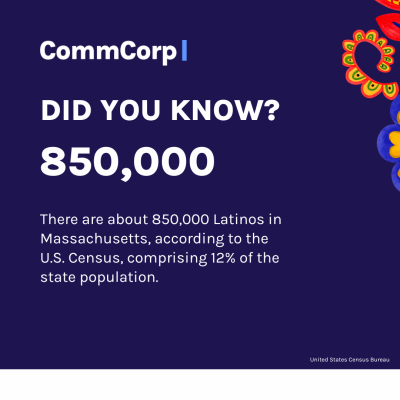
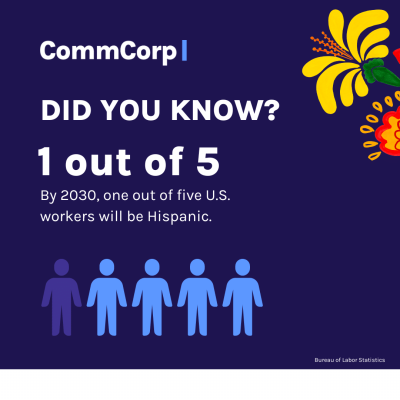
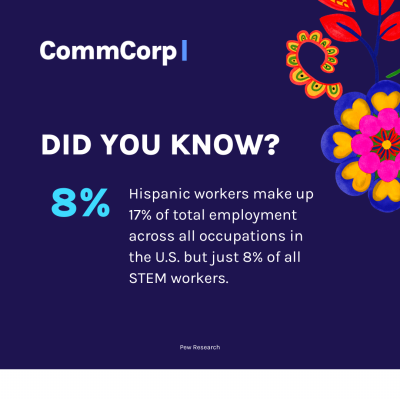
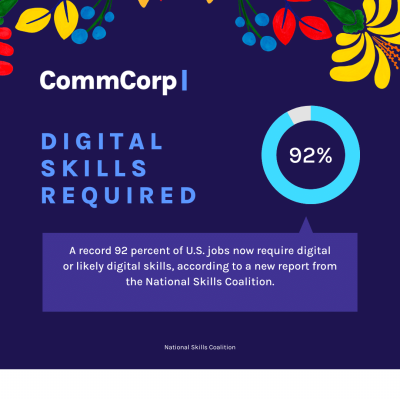
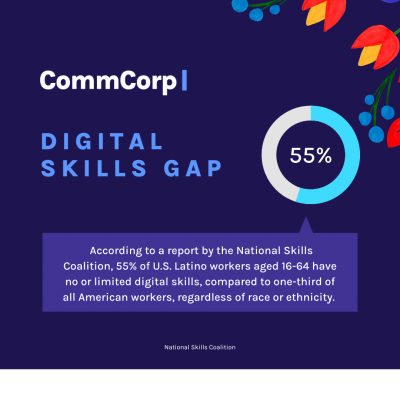
According to the Latino Donor Collaborative-HITEC 2021 Latinos in Technology Report, 77% of Hispanics and Latinos in the U.S. own a smartphone, 89% own at least one computer, and 66% own at least one smart TV. This data underscores that Hispanics and Latinos are active digital users. However, a 2021 report from the Executive Office of Labor and Workforce Development (EOLWD) of Massachusetts reveals that the top five communities with the highest concentration of Hispanic and Latino residents—Springfield, Lawrence, Holyoke, Lynn, and Chelsea—still have a higher percentage of households without broadband compared to the state’s total of 14%. Access to broadband, or the lack thereof, has direct implications for economic, educational, health, and societal outcomes.
Thankfully, numerous organizations, including nonprofits and government agencies, have undertaken initiatives to address the digital skills gap among Hispanic and Latino workers. These initiatives encompass training programs, workshops, and collaborations with local communities and businesses.
In 2021, the 117th Congress approved the Digital Equity Act, allocating $2.75 billion to initiatives promoting digital inclusion. Out of this funding, $1.5 billion is earmarked for states through two grant programs, while an additional $1.25 billion ($250 million annually over five years) is designated for various organizations through a competitive grant program. Oversight for these programs falls under the National Telecommunications and Information Administration (NTIA) within the U.S. Department of Commerce.
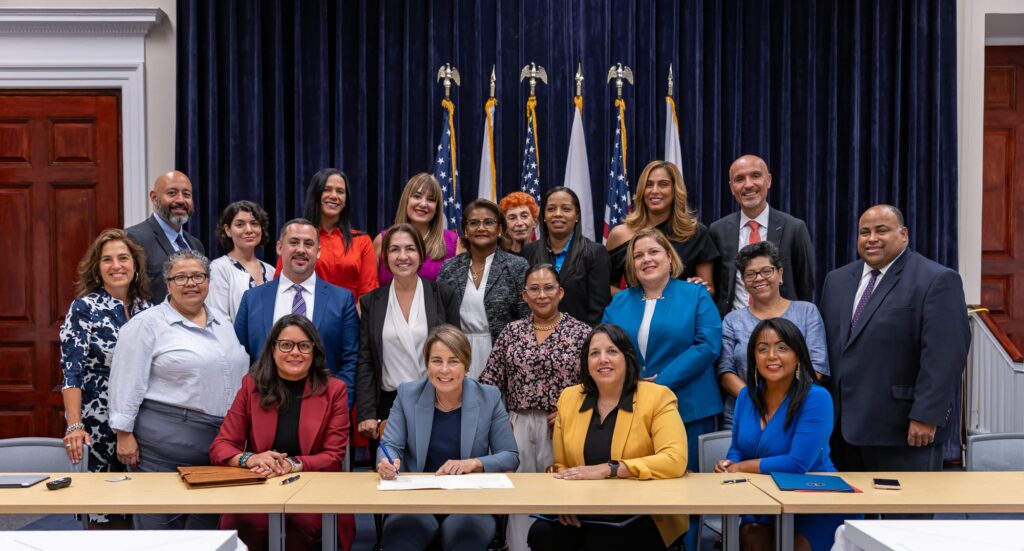
Governor Maura T. Healey took a significant step on April 5, 2023, by signing an Executive Order that officially established the Governor’s Council on Latino Empowerment. In this action, she appointed over 40 accomplished Hispanic and Latino leaders representing diverse backgrounds and regions across the state. The primary objective of this council is to serve as a trusted advisory body to Governor Healey and Lieutenant Governor Kim Driscoll. Their collective mission is to strategize and propose initiatives aimed at enhancing economic opportunities and fostering an improved quality of life for the essential Hispanic and Latino community of Massachusetts.
Furthermore, our organization, CommCorp, leads the way in workforce development, championing workforce equity in Massachusetts by delivering innovative and collaborative professional development solutions that empower diverse communities and employers to succeed. Serving as the bridge between public and private partnerships, our vision is a world where meaningful employment leads to upward mobility for all. We invest in the future workforce, develop a pipeline of workers, provide training, and upskill the current workforce. Last year, we impacted over 30,000 workers. As we continue our journey, our focus remains on making the most significant impact in historically disadvantaged communities and among those most affected by the pandemic. Our commitment lies in identifying and dismantling historical and existing barriers within systems, policies, and practices to create long-term economic opportunities and access for all. I invite you to explore our programs and discover how we can assist you today.
In summary, digital skills development is indispensable in the digital age, empowering individuals to engage fully in the modern world, secure employment, enhance efficiency, and contribute to societal advancement. It forms an essential part of lifelong learning and an investment in personal and professional growth. By investing in digital skills development for the Latino workforce in Massachusetts and across the country, we can pave the way for a more equitable and prosperous future. Let’s leverage Hispanic Heritage Month to celebrate culture, promote diversity and economic empowerment, and collectively work towards a brighter, more inclusive tomorrow.

 About the author: Josephina Romero is the Director of Innovation & Transformation at Commonwealth Corporation, where she leads strategic initiatives that have resulted in significant gains and operational enhancements.
About the author: Josephina Romero is the Director of Innovation & Transformation at Commonwealth Corporation, where she leads strategic initiatives that have resulted in significant gains and operational enhancements.